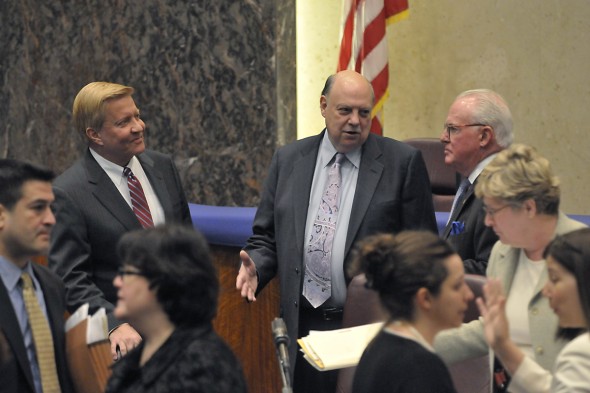Emanuel has more council support than Daleys

Political science professor Dick Simpson, center, talks with Ald. Bob Fioretti, left, and Ald. Ed Burke, at a Chicago City Council hearing. Photo: Roberta Dupuis-Devlin/UIC Photo Services
Mayor Rahm Emanuel has a level of support from the Chicago City Council even greater than mayors Richard M. and Richard J. Daley, says a new report from the UIC political science department.
The study by Dick Simpson, professor of political science, and graduate researcher Melissa Mouritsen Zmuda measures aldermanic voting patterns and the opposition Emanuel has faced over two years in office.
“Mayor Emanuel presides over a more compliant ‘rubber stamp’ city council than any mayor in recent history,” Simpson said.
From June 8, 2011, through Feb. 13, 2013, there were 30 divided roll call votes in which at least one alderman opposed Emanuel’s administration, the study finds.
Simpson and Zmuda said 21 aldermen voted to support Emanuel’s position 100 percent of the time and 18 aldermen voted with him over 90 percent of the time. Only seven of the 30 issues drew six or more dissenting votes.
The average level of council support for Emanuel was 93 percent on all divided roll call votes, surpassing the 88 percent earned by Richard M. Daley during his last term and Edward Kelly in 1939-1940.
It was greater than the 83 percent (1955-1956) and 85 percent (1971-1972) achieved by Richard J. Daley.
The full report, “Continuing the Rubber Stamp City Council,” which details the voting patterns and historical comparisons, is available online at http://bitly.com/YJfFo3
The most dissent occurred during the council’s vote on Emanuel’s proposal to place cameras in Children’s Safety Zones near schools to catch speeding drivers, with 14 aldermen voting against.
The report says the mayor’s main opposition comes from two rookies, 45th Ward Ald. John Arena and 36th Ward Ald. Nicholas Sposato, and incumbents 2nd Ward Ald. Bob Fioretti, 32nd Ward Ald. Scott Waguespack and 5th Ward Ald. Leslie Hairston.
Voting by most of the 32 reelected aldermen saw little change between the Daley and Emanuel administrations, except 22nd Ward Ald. Ricardo Munoz and 49th Ward Ald. Joe Moore.
“Munoz voted only 65 percent of the time with Mayor Daley but voted 87 percent with Emanuel,” Zmuda said.
“Moore too reversed course, voting 51 percent with Daley but 97 percent with Emanuel.”
Simpson said voting patterns could be affected by a recent split in the council’s independent caucus.
The nine-member Progressive Reform Coalition’s priorities include a moratorium on new charter schools, regulating privatization of city assets and greater control over bidding on city contracts.
The 10-member Paul Douglas Alliance seeks greater power for the city inspector general, allowing aldermen and their staffs to be investigated for corruption like other city employees.
“The alliance supports the mayor and the reform coalition provides much of the opposition to the mayor,” Simpson explained.
“The split in the progressive ranks, however, makes the mayor’s control more complete.”
